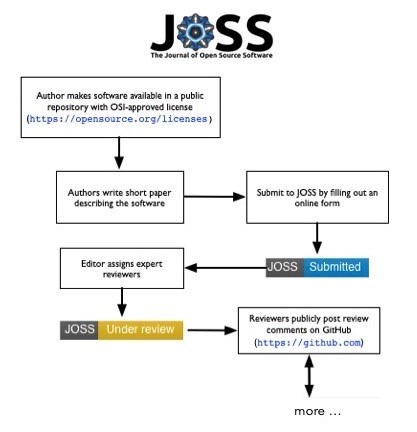 |
| February 2020 Volume 9 Issue 1 |

It’s hard to imagine doing research in 2020 without relying on software. Almost every task, from data acquisition and data processing to modeling and visualization, involves a software component. The rise of open-source software in science has empowered generations of researchers to build upon the work of others like never before. But the credit and incentive systems of academia have failed to keep up. Researchers investing large portions of their time building and maintaining crucial open-source software often find themselves lagging behind their peers in terms of academic currency: papers and citations.
The Journal of Open Source Software (JOSS; https://joss.theoj.org) was created to solve this problem. It’s a developer-friendly journal that publishes papers about research software, providing credit to developers in the form of a citable paper. JOSS is far from your average ... [full article]
Contributed by The JOSS Editorial Team
The ASPECT User Community held its very first completely virtual workshop on January 21-23, 2020. A total of 35 participants, including members of the international community, joined online for presentations and discussions and breakout sessions. The majority of the participants were early career and 16 had never attended an ASPECT Hackathon. A big part of the success of the meeting were our 10 community members, who gave excellent presentations and were not afraid of bringing their scientific and software development work to a new presentation format! The event sparked some discussions that lead to new features in the following days. The feedback was very positive and we look forward to holding this event next year. For every 1,000 km participants did not fly for this event, we prevented the emission of 133 kgs of CO2 (and countless hours saved in sleep).
CIG is pleased to announce a new release of ConMan (version 3.0.0), a 2D Cartesian finite element code for mantle convection. In this release, the cumbersome c-based malloc package for dynamic memory allocation in Fortran77 is replaced with allocate and deallocate statements. The new version includes the compressible convection formulations commonly used in deep earth dynamics as well as examples based a subduction zone benchmark. Users looking for a simple code that uses a direct matrix solver and has no external library dependencies may find this code to be a useful starting point.
[ConMan]
Do you know someone who would be a great ambassador for CIG research? The CIG Speaker Series is looking for talented speakers who can promote computational modeling in geodynamics and related earth sciences to a broad scientific audience. Send your nominations to speakers@geodynamics.org. More information for speakers and institutions looking for speakers can be found on our website. Deadline is February 28, 2020. [info]
Congratulation to: Jackie Austermann, Columbia University, recipient of the 2019 Jason Morgan Early Career Award, and Sylvain Barbot, University of Southern California recipient of a 2019 NSF CAREER award.
Please join us in welcoming Bruce Buffet and Claire Currie to the Executive Committee and Juliane Dannberg and Scott King to the Science Steering Committee. They will be serving 3 year terms ending in 2022. Many thanks to EC member Frederik Simons and SSC members Brad Aagaard and John Rudge for their contributions to the community as well as everyone who participated by voting in this year's elections.
Welcome to our newest member University of Florida and Member Representative, Juliane Dannberg.
The 2020 annual meeting of the Canadian Geophysical Union (CGU) will be held in Banff, AB, May 3-6. CIG is once again partnering with CGU for this event. The theme of the meeting reflects the full range of the CGU’s scientific interests is Addressing Challenges in Earth and Environmental Sciences. The CIG community is invited to submit abstracts to all sessions. The deadline for abstract submission is February 25, 2020. Travel support will be available for U.S. based researchers. [more info]
[2020 CGU]
Time to think about summer! CIG summer workshop planning has begun.
Registration and more information for the 2020 Tectonics Workshop will be coming soon.
information for the 2020 Tectonics Workshop will be coming soon.
Save the date for the following Fall workshops.
Remember to join our forum to receive announcements for these events. [Forum]
| February 26 |
Brandon Schmandt, University of New Mexico |
| March 12 | Nicole Gasparini, Tulane University, and Jane Willenbring, Scripps Institution of Oceanography |
| April 9 | Ved Lekic, University of Maryland |
| May 7 | tbd |
ConMan v3.0.0 31 January 2020